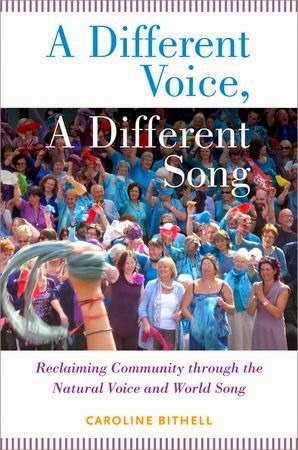[A version of this article first appeared as a post on my blog From the Front of the Choir]
You may have come across the term ‘natural voice’. You may also have realised by now that I am a member of The Natural Voice Network.

But what exactly is the ‘natural voice’ and how do choirs run on ‘natural voice’ principles differ from other choirs? You’re in luck! Caroline Bithell has just written an amazing book that answers all your questions. Let’s look at what’s in it.
I’ve written before about the Natural Voice approach to singing and you can also find out more about the general philosophy on the Natural Voice website.
Natural voice choirs are very different beasts from the rest of the choral world, and are rare in countries such as the United States. They can be described roughly as choirs which:
This is a very rough categorisation within which there is a wide range of natural voice choirs ranging from singing for fun choirs which don’t perform, to choirs which record CDs and perform regularly to a very high standard.
Bithell sums it up like this:
“The image of the open, egalitarian, naturalistic singing community that natural voice practitioners seek to recreate would appear to be diametrically opposed to the contemporary Western model of the highly trained professional musician performing pre-composed works, usually read from a printed score, in a dedicated arts venue for a comparatively passive audience, most of whom — whilst appreciating music — would not consider themselves to be ‘musicians’.” A Different Voice, A Different Song, p51
Her book is called A Different Voice, A Different Song – Reclaiming Community Through the Natural Voice and World Song and is published by Oxford University Press in hardback, paperback and as an eBook.
It is a masterful account of all the various strands which have come together to create the natural voice movement and should answer all your questions. But if you still have some after reading the book, drop me a line and I’ll try to answer them!
In summary, Bithell’s book:
“traces the history of a grassroots scene that has been gently gathering force since the 1970s. At the core of this scene today are the natural voice movement, founded on the premise that ‘everyone can sing’, and a growing transnational community of amateur singers participating in multicultural musical activity … Bithell shows how amateur singers who are not musically literate can become competent participants in a vibrant musical community as they find their voice both literally and metaphorically.” A Different Voice, A Different Song, rear book cover
Go and buy one now. Happy reading! (Cheapest copies currently available at The Book Depository or Amazon.co.uk, February 2019)
Chris Rowbury
website: chrisrowbury.com
blog: blog.chrisrowbury.com
Facebook: Facebook.com/ChrisRowbury
Twitter: Twitter.com/ChrisRowbury
Monthly Music Roundup: Tinyletter.com/ChrisRowbury